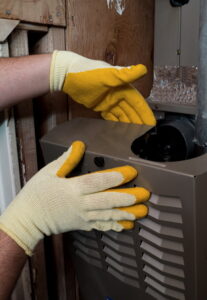
Seasonal changes affect your HVAC system in different ways. Traditionally, the advice around protecting your furnace says to have a professional inspection late in the fall, just before winter. This is perfectly sound advice, but there’s just as much value to running a performance check-in post-winter too.
Winter is every heating system’s busiest period. After months of peak use, your furnace is at its most vulnerable coming out winter. A check-in here can offer you vital insights into your furnace’s efficiency, performance, and repair needs.
Let’s go over some simple ways to examine your furnace at home. If you notice any of these signs, it’s time to book a professional HVAC service for repair and maintenance.
Audit your utility bill
When a furnace isn’t running at peak efficiency, it ends up drawing more electricity to compensate. While you may not notice this day-to-day, it’s an awful surprise when the energy bill arrives at the end of the month.
Keeping a record of your furnace’s monthly energy usage is an easy way to track performance levels over time. If you notice an unusual spike, it may be a sign of damage or a system fault.
Check for uneven heating
When a furnace can’t compensate for reduced efficiency, it can’t properly regulate heat throughout a house. When your furnace is running, check for signs of uneven heating in different zones inside your home.
Cold spots, where some zones don’t receive as much warmth, are the main symptom of uneven heating. This is another performance issue that can raise your utility bill while limiting output.
Listen for loud and strange noises
When conducting a performance check-in, listen for strange noises all across the heating system, but especially near the furnace. Loud noises are usually a sign of mechanical damage, but the causes can vary.
Thumping noises are typically made by an unbalanced blower wheel or motor. Loud humming can mean there’s a fault with the fan. When dirt gets into the furnace burners, it can disrupt the gas and ignition system, producing banging or popping noises.
Turn off your furnace the moment you hear any strange noise and contact an HVAC professional.
Short-cycling
Furnaces heat air in on-off loops called cycles. In a functional furnace, these cycles will run in regular intervals until the air reaches the right temperature. Short-cycling is when a heating system shuts down before completing a full cycle.
You can check for this by timing your furnace’s heating cycles and feeling the air coming out of the heat grates. A damaged furnace will shut off before it can fully warm your home. If the air temperature doesn’t match your thermostat settings, short cycling may be the issue.
If the air coming out of the grates is hotter than it should be, your furnace may be shutting down early because of overheating.
Need a performance check-in for your furnace in Bryn Mawr, PA? We’re the people to call for the job!
Michall Daimion Heating & Air Conditioning, Inc. has been the Main Line’s Premier Service Provider since 1976. Arrange for heating system services with us.
